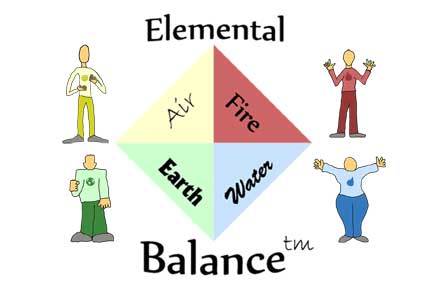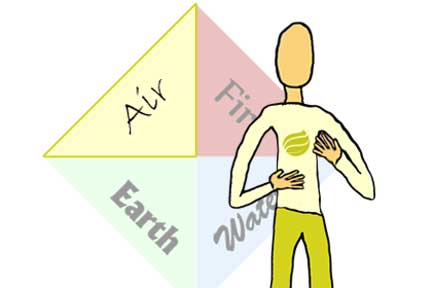Elemental Balance - Air

Our understanding of the body;
the diagnostic techniques that we use;
the individualization of the diet, supplements and treatments;
are unique to HNNH.
No other clinic,
naturopathic, alternative or otherwise, does what we do.
We have a 3-stage model of how the body works that guides us in understanding you. This model is a result of my experience over the last 20 years, combining my training and experience as a naturopathic doctor, a licensed acupuncturist, and various constitutional systems, BioPhenotype (blood type markers), Chinese and Ayurvedic medicine.
At the core is your Constitution, a combination of the BioPhenotype and Elemental Balance– who you are when you’re healthy, and therefore what we’re aiming for in your healing. We are not all the same, and without an understanding of what your core needs are, and where you’re heading towards, it’s impossible to know what the body needs to get healthy. Historically there were many healthy cultures that did different, almost contradictory things to stay healthy – how do we know which one should be your guide?
To understand how the Air affects your physical, mental and emotional being, you need to consider the qualities of Air in nature. Air is essentially cold, dry, and light, floating above the Earth Air can have a very light touch as it gently passes over the objects in its path, or it can move with great force, as in a tornado or hurricane. Air as wind constantly changes speed and shifts direction. The wind cools, dries, scatters and erodes as it blows.
How to Recognize the Effect of Air on Your Physique: The stamp of the Air element on the physical body is of a dry quality leading to a bony, knobby thinness, as if the flesh and substance had dried up and eroded away. This effect becomes more prominent as we enter our later years. The cheekbones stand out on an elongated, narrow face. . The long, slender, sinewy neck connects below to prominent collar bones and a narrow chest. The shoulders, elbows, wrists, and knees protrude from the slender arms and legs. The hips are slender. The voice becomes hoarse when overused.
How to Recognize the Effect of Air in the Mind and Emotions: Air is both the contemplative aspect of the mind that brings inspiration, and the nervous agitation, fear, and anxiety. Often, these alternate within the same individual to varying degrees.
Air is the element that reaches to bring new insights, revelations, discoveries, and knowledge down to Earth. No matter the field, Air reaches high for its inspiration and creativity. Anyone with strong intuition has a connection to the Air element. Air is indispensable for refreshing or charging the world with new concepts and ways of doing things.
At the same time, the Age of Anxiety is most certainly the Age of Air. Because Air’s connection to the world and life is as tenuous and thin as Air itself, security seems an impossible dream. Air is preoccupied by and fascinated with ideas, concepts, theories, and philosophies, and takes them up eagerly only later to be plagued by doubt. None of them withstand Air’s restless scrutiny. Air always finds another explanation, another theory that seems equally plausible. The Air person tends to be mentally scattered, jumping from subject to subject. They sit down to a task determined to see it through, only to see their focus taken away by the sound of the ringing phone, or something they wanted to check online. They may stop in mid-sentence to concentrate on a new thought that pops into their mind. Their quick mind instantly understands what you want to say and impatiently wants you to finish your sentence, possibly finishing it for you.. Air forgets as quickly as it comprehends, and anything not written down runs the risk of vanishing forever from their consciousness.
The Air intellect can be lofty and expansive, but largely in a theoretical, academic way. They are the classic “book smart”, as their knowledge may be at once encyclopedic and superficial. The Air’s connection to their interior world is very strong, and the Air spends a lot of time day-dreaming, theorizing, and philosophizing.
Air people are easily overwhelmed and over-stimulated in groups of people, and often need to retreat to solitude to soothe the agitation of the nervous system. Air people tend to be very delicate, sensitive, and aware. They frequently feel socially awkward and are often very self-conscious. They can spend hours ruminating over imagined slights and fretting over things they said or did.
Air people are restless and irritable, and often fidget and pick at themselves.. Air sits cross-legged with the dangling foot bouncing frantically in an attempt to discharge the excess nervous energy pulsing through their bodies.
Career Choices for Air People: Air people often have a gift for communication, and therefore are naturally suited to teaching and counseling. Those who have worked through their own fears or addictions make excellent guides for others. When Air is Balanced: An Air person achieves balance when the turbulent and chaotic aspect of Air is quelled and the pure, still, and clear attributes of Air are emphasized. This often requires a disciplined life with steady practices such as meditation and yoga. A balanced Air person is creative, intuitive, flexible, adaptable, and fAir. What causes Air Imbalances: An Air imbalance is created when the environment becomes too “Airy”. As Air is changeable (think here of the shifting of the wind), too many changes can bring about imbalance. This can be as simple as a change in the weather or climate, that naturally occurs during changes of season, especially as summer fades into autumn. Travel, whether for business or pleasure, always affects the Air system, as it increases the Air qualities of movement and change. Major life changes such as marriage, divorce, a new job, a move to a new home, and even minor changes can shift Air into imbalance. Stresses of all sorts are experienced in the Air system, and can lead to an Air overload. Too much communication, such as occurs with cell phones, text messages, emails, and TV watching increases the Air element’s imbalance. Overwork and over-stimulation, twin hallmarks of the modern era, aggravate the Air element. For people of the relatively delicate Air body type, heavy exercise, such as running to exhaustion to calm an over-stressed mind, also contributes to an Air imbalance.
How to Recognize Air Imbalances: The nervous system is the area to keep in mind when considering the way Air works in the function of your body – any nervous habit, hyperactivity, or anxiety is a sign of Air. Insomnia is often seen during times of Air disturbance, as the restless, relentless mind struggles to find the peace and relaxation required to drift into blissful sleep. The most frequently seen physical Air disorders occur in the digestion in the form of gas, bloating, abdominal cramps, and constipation with dry, hard stools. Rushing through meals, eating when upset, angry or nervous, or eating on the fly all contribute to the formation of gas and bloating.
The hands and feet of the Air person are often cold, naturally more so in the cold seasons. Spasms, tremors, tics and twitches are all disturbances of the Air in your body. Excess Air working in the skin causes flakiness, dryness and cracks,. Air imbalances that frequently accompany aging include hardening of the arteries, osteoporosis, balding, wrinkling and thinning of the skin, and liver spots. Irregular heart rhythms and palpitations may result from excess Air, especially as fear often accompanies and aggravates this condition.
How to Remedy Air Imbalances: Air is balanced by foods, therapies and lifestyle choices that oppose its natural dry, light, cold, shifting tendencies. The word “grounding” sums up the gist of the following recommendations. In general, the Air –dominant person needs to cultivate a lifestyle that deliberately creates stability, calm, and peace, all natural qualities of the Earth element. There should be a daily routine in place that introduces a steady rhythm into life to counter the erratic nature of Air.
Resolve to awaken early to allow ample time for all the things that need to get done before the work day commences.The morning is the most peaceful time of day, and it is an excellent start to get outdoors for a morning walk or other exercise and fill your lungs, eyes and ears with the clarity and peace that this time offers. A period of meditation, prayer, contemplation, yoga or t’ai Qi will help to cement the feeling of centeredness and peace into place before the craziness of the work day begins. Once the dinner dishes are done at the end of the day, the evening should be devoted to winding down toward a peaceful night of sleep.. Foods that are warm, dense and moist counter the effects of Air, such as a bowl of oatmeal, rice, steamed vegetables, or soup.








